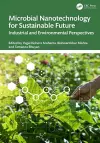
Microbial Nanotechnology for Sustainable Future
3 contributors - Hardback
£115.00
Dr. Yugal Kishore Mohanta is currently working as an assistant professor at the Department of Applied Biology, University of Science and Technology, Meghalaya (USTM), India. He has over five years of extensive post-PhD research experience in the fields of nanobiotechnology, microbiology, and SDGs. As a dedicated researcher and academician, he has honed the skills and knowledge in these areas. Furthermore, he has successfully published over 101 scientific articles (Q1/Q2/Q3) in SCIE-indexed journals, edited 5 books (Elsevier, CRC Press, Springer-Nature), 25 book chapters, and 2 Indian patents in his field of expertise. From the publication, Dr. Mohanta has garnered >3300 citations, an h-index of 31, and an i10-index of 66. Dr. Mohanta is also working as a reviewer for more than 30 reputed journals and a guest editor for many special issues of Springer Nature, Frontiers, etc. Additionally, he established a research lab (NanoBioTraK_Lab) through the SERB-DST grant (2022-24), Government of India. In 2024-25, XJENZA MALTA, the Government of Malta, sponsored an international research network project scheme grant for him. He is also the recipient of the International Leadership Award for "Education for Sustainable Development-2024" from Edufam International Academy, Al Bustan, Dubai. With his strong set of skills and qualities, he excels in the fields of science, education, and social work. Dr. Mohanta is particularly interested in prioritizing the concept of translational research in the field of sustainable development. In addition, he serves as the Chief Coordinator for the Microbiologists' Society of India, promoting science and research in the northeastern states of India.
Dr. Bishwambhar Mishra brings over a decade of post-PhD experience in teaching and research and is currently an Assistant Professor in the Department of Biotechnology at Chaitanya Bharathi Institute of Technology in Hyderabad, India. His primary research areas include industrial microbiology and nanobiotechnology, with a focus on their applications. His work is aimed at harnessing the potential of microorganisms and nanotechnology to address pressing global challenges such as environmental sustainability, food security, and resource management. Dr. Mishra has made significant contributions to the scientific community, authoring 75 research publications in high-impact, SCIE-indexed journals, with his work garnering 1,146 citations, an h-index of 19, and an i10-index of 34. These publications reflect the high caliber of his research, spanning various interdisciplinary domains. In addition to his extensive publication record, he has authored 1 book and 20 book chapters that further advance knowledge in the field. His dedication to the academic and research community extends beyond his publications. Dr. Mishra has served as a reviewer for over 30 prestigious international journals, including those published by renowned publishers such as Springer, Elsevier, Wiley, Frontiers, and MDPI. His expertise is further recognized through his role as Topical Editor and Editorial board member of SCIE-indexed journals, where he plays a critical role in shaping scientific discourse and guiding future research.
Dr. Tamanna Bhuyan is currently working as an Assistant Professor at the Dept. of Applied Biology, University of Science and Technology Meghalaya. Her primary research areas include the fabrication of micro/nanobots, nanoparticle synthesis, drug delivery studies, anticancer therapeutics, and environmental remediation. Her research focuses on exploring nanostructured and nanocomposite materials in the context of societal needs and all other areas of industrial applications. Dr. Bhuyan bagged the Best PhD Thesis Award from IIT Guwahati and has made significant contributions to the scientific community by publishing more than 20 research papers in high-impact journals, and holds two patents till date which gardening >1000 citations, a h-index 8 and i10 index 8. She has been awarded 3 projects sponsored by the Ministry of Electronics and Information Technology, the New Generation Innovation and Entrepreneurship Development Centre project, and DST-SERB, funded by Government of India. She also received the Women Scientist Award by the Microbiologists Society, India, and SITARE-GYTI (Gandhian Young Technological Innovation) Appreciation Award for her notable contributions in interdisciplinary domains.